A Grand Tour of Great Universities
Ten First-Round Literary Draft Picks
How does somewhere become a place? What is the transformation that causes us to feel deeply attached to a location that meant little to us earlier? Take your college town as an example. How did that handful of years in Madison or Durham or Billings synthesize in equal parts self and place to leave “you” and “there” irrevocably linked? For us readers and lovers of literature, the “there” also extends to the personalities of the presses maintained by universities. What’s not to love about the oddity of asking a university to publish competitively in the open, bareknuckle book industry? It seems as incongruous as asking them to design and manufacture haute couture in the fashion industry. But books it is, and, most gratifyingly, at the university presses in America, there is a place for poetry, essays, LGBTQ fiction, and other important genres that can’t be published with profit in mind.
So join us on this visit to ten universities doing good work with books. You won’t be sorry you did.
Phantom of the Ego
Modernism and the Mimetic Unconscious
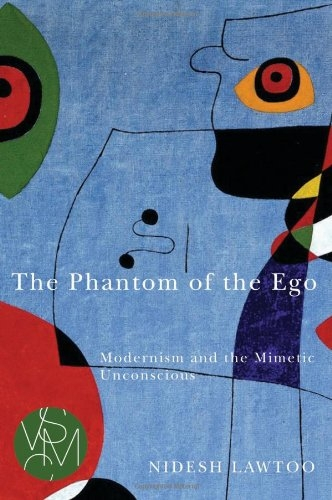
Nidesh Lawtoo
Michigan State University Press
Softcover $29.95 (424pp)
978-1-61186-096-2
Buy: Local Bookstore (Bookshop)
Picture yourself in the early twentieth century, fully alive and engaged with the modernist movement’s flowering in the arts, literature, and psychology. Here’s the catch: imagine that the Father of Modernism, Sigmund Freud, didn’t exist. How would our ideas of the unconscious mind, the modern psyche, look without Freud’s psychoanalytical infant/Oedipal/repressed configurations?
Mind blowing, actually.
In The Phantom of the Ego, Nidesh Lawtoo wants us to call into question everything we think we know about the human ego: how it developed, what purpose it serves, how is it influenced, etc. He points to newborns showing imitative reflexes—a self-other connectedness—at thirty minutes of age, and reminds us that Freud had many contemporaries working on competing ideas of the human psyche. Nietzsche, especially, took a wildly different path; what he called the ego’s “phantom.” Lawtoo explains Nietzsche’s premise: “this phantom is born out of an unconscious process of psychic ‘communication’ that spreads contagiously from self to others, one head to another head, depriving ‘the great majority’ of their own thoughts, values, and opinions and, thus, turning their ego into what he calls, once again, a ‘phantom of the ego.’”
In addition to Nietzsche, Lawtoo pens chapters on other Modernist explorers, including Joseph Conrad, D. H. Lawrence, and Georges Bataille.
Lawtoo’s purpose is not to knock Freud from his lofty place—but, obviously, human consciousness, the supposed pinnacle of the evolutionary process, as well as Eastern ideas of duality, may have some more ’splaining to do.
MATT SUTHERLAND (November 30, 2013)
The Glass Slipper
Women and Love Stories
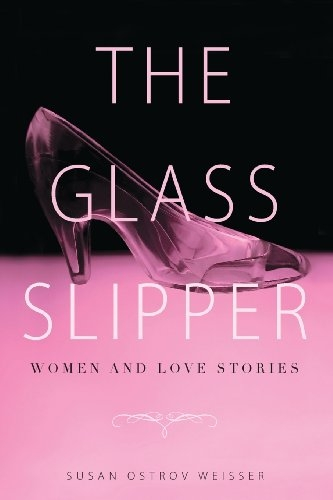
Susan Ostrov Weisser
Rutgers University Press
Softcover $26.95 (264pp)
978-0-8135-6177-6
Buy: Local Bookstore (Bookshop)
Knowing what we now know about our imitative impulses, we can venture forward to the realm of culture, comfortable with the idea that to live in a place is unavoidably to live out the hopes and dreams of that place. Consider The Glass Slipper, Susan Ostrov Weisser’s immensely satisfying effort to understand why modern women still subscribe to Victorian ideals of love and romance. Why, indeed, she wonders, especially in light of the great feminist strides made toward equality between the sexes in the seventies and glass ceilings falling throughout corporate America more recently.
Irony of all ironies, she notes, is that Harlequin novels launched at the same time feminism was hammering home the fact that marriage and romance were oppressive to women.
A professor of English at Adelphi University, Weisser has long engaged her students in ribald discussions about their contemporary relationships to better understand why the digital age still sees the same patterns. “In our society,” she writes, “there is a Tinker Bell approach to ‘believing in love’: it authorizes itself, much like religious faith.”
MATT SUTHERLAND (November 30, 2013)
Unclenching Our Fists
Abusive Men on the Journey to Nonviolence
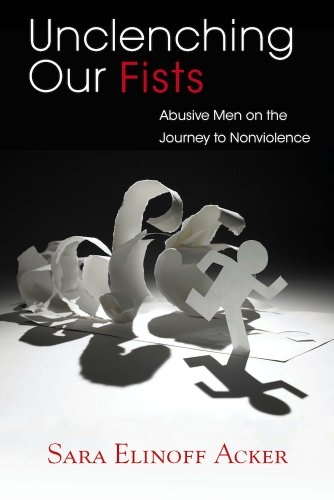
Sara Elinoff Acker
Vanderbilt University Press
Softcover $19.95 (208pp)
978-0-8265-1942-9
Buy: Local Bookstore (Bookshop)
Sara Elinoff Acker has been studying relationships, albeit the violent type. In Unclenching Our Fists, she explores a litany of depressing questions, beginning with why some men become abusive and leading to the eyes-wide-open discussion of whether they can change their evil ways. Active in the battered-women’s movement for more than twenty-five years, Acker has seen some reasons to be encouraged over the years. Her book tells the first-person stories of eleven men from all walks of life who have made serious long-term progress in ending their violent, controlling behavior.
MATT SUTHERLAND (November 30, 2013)
The Small Heart of Things
Being at Home in a Beckoning World
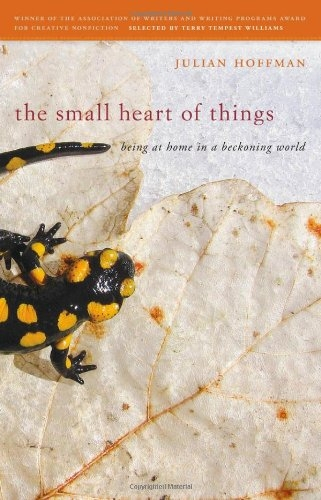
Julian Hoffman
The University of Georgia Press
Hardcover $24.95 (176pp)
978-0-8203-4556-7
To understand Julian Hoffman’s goals in The Small Heart of Things, you must consider two ideas from his preface: 1) “Awareness is becoming acquainted with environment, no matter where one happens to be,” in the words of Sigurd Olson, and 2) in describing the essence and beauty of place, Hoffman writes, “The way anywhere can take hold, and burrow deep within. … Which is why these days I prefer to think of place as wherever I happen to be, and the relationship that can be brokered with it.”
In writing this remarkable work of environmental and natural-history literature, Hoffman resided in the Prespa Lakes Transboundary Park shared by Greece, Albania, and the former Yugoslav Republic of Macedonia. These seventeen short essays capture an intensely focused, curious, tireless, supremely gifted writer as he acquaints himself with himself and one of the world’s most unique places.
MATT SUTHERLAND (November 30, 2013)
Shake Terribly the Earth
Stories from an Appalachian Family
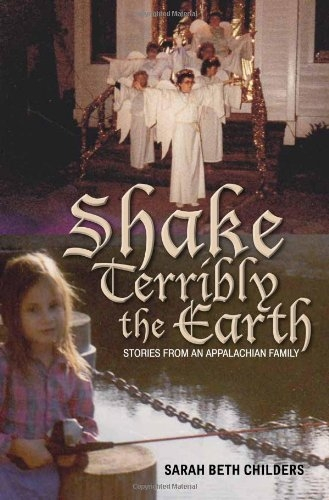
Sarah Beth Childers
Ohio University Press
Softcover $24.95 (213pp)
978-0-8214-2062-1
Buy: Local Bookstore (Bookshop)
Little did we know that Ohio University Press has a series of books on race, ethnicity, and gender in Appalachia. The latest, Shake Terribly the Earth, is a tightly connected collection of essays from Sarah Beth Childers’s rural, challenging, Fundamentalist Christian childhood. Rather than lean heavily on a slew of positive adjectives to describe her writing talent, let’s let her do the talking. The following excerpt is drawn from Childers’s description of a family reunion, where a young Christian band is warming up:
“But then, while the singers were testing their microphones and the Pearsons were still loading cobbler onto their dessert plates, a man stood up in front of his folding chair. He had a prominent mole on his large nose, and his untucked shirt had a greasy stain. To my teenage eyes, this man looked repulsive, more like a cobbler-devouring Pearson than a vocalist whose music I’d buy on CD. ‘I’m your dear sister Rita’s pastor,’ he explained, motioning toward the beaming elderly woman in the seat beside him. ‘She asked me to sing “Beulah Land” for you all.’
The man paused while a few uncles shuffled to their seats, and then he closed his eyes and sang. He launched his unaccompanied baritone into that linoleum-tiled room, and I realized this was the way the song was meant to be sung. A pure expression of the spirit. …
After the song ended, the man confided, ‘When I think of that song, I think of my mother.’ The elderly female audience chuckled with approval. Then he told us a story. The night his mother died, he drove her to the hospital, surrounding her emaciated body with pillows in the backseat of his station wagon. The road was long, winding, and potholed, and every bump jolted agony through her bones. ‘Honey,’ she gasped, ‘sing “Beulah Land.”’ Her son’s voice filled the car, and she imagined herself already in heaven.”
MATT SUTHERLAND (November 30, 2013)
The Splendor Falls
Essays
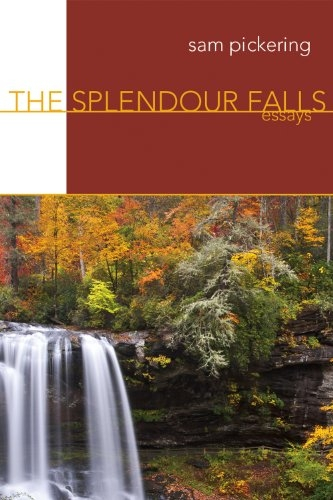
Sam Pickering
Mercer University Press
Softcover $20.00 (224pp)
978-0-88146-449-8
Buy: Local Bookstore (Bookshop)
Sitting down and enjoying a good, tight essay, we can confidently say, is an acquired taste. Moreover, essays are terribly difficult to write, and publishers will tell you essay collections are second only to poetry in sales ineptitude.
But we’ve included several books of essays in this university press feature because we get weak-kneed around great writing, and this next book finds a writer at the top of his game.
The author of twenty-five-plus books, mostly essay collections, southern Sam Pickering ranks among the most esteemed essayist names in our country. In his newest collection, The Splendour Falls, he writes about walking, fidgeting, mushroom pie, and uneventful but mesmerizing jaunts to Nova Scotia, the Caribbean, and the basement of his local library. His words fall in place like pixie dust on a rose petal.
MATT SUTHERLAND (November 30, 2013)
Salmon, People, and Place
A Biologist’s Search for Salmon Recovery
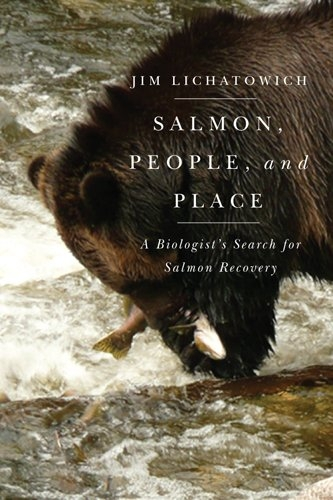
Jim Lichatowich
Oregon State University Press
Softcover $22.95 (272pp)
978-0-87071-724-6
Buy: Local Bookstore (Bookshop)
Jim Lichatowich’s Salmon, People, and Place is written with such a steady, knowledgeable hand that readers may get the false impression that salmon prospects in the Pacific Northwest must be improving if someone as qualified as Lichatowich is on the job. Alas, no. The problem, he notes, “is the fact that our relationship with the salmon is largely economic. Salmon are managed as a commodity. Management of this commodity is more consistent with economic dogma than ecological principles.”
This book takes on current efforts at salmon management, pokes at the misconceptions, and offers tangible, readily implementable recommendations to correct course.
MATT SUTHERLAND (November 30, 2013)
Object and Apparition
Envisioning the Christian Divine in the Colonial Andes
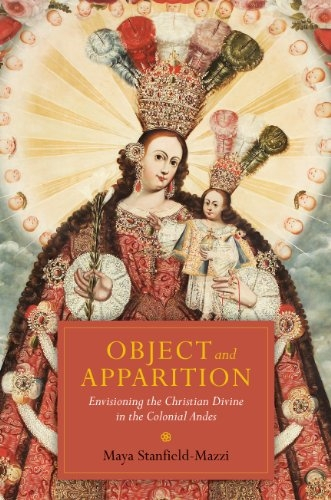
Maya Stanfield-Mazzi
The University of Arizona Press
Hardcover $50.00 (264pp)
978-0-8165-3031-1
In 1532, when Christianity first came to the Andes, Spanish colonizers translated Christian texts and music into the native languages and did their damnedest to open the hearts of Andeans to the message of Christ, virgin birth, and the notion of salvation. Object and Apparition is convincing in its premise that the locals were skeptical until sculptors, painters, and other visual artists “began to use local materials—often metals, pigments, and fibers that were sacred within the Andean worldview—to represent key Christian subjects.”
Catholicism is practiced with a distinct Spanish and indigenous flair in the Andes, and Maya Stanfield-Mazzi’s archival research and exploration of the region’s principal religious artworks (the book includes fifty-three photos and nine color plates) makes for fascinating reading.
MATT SUTHERLAND (November 30, 2013)
Maximilian and Carlota
Europe’s Last Empire in Mexico
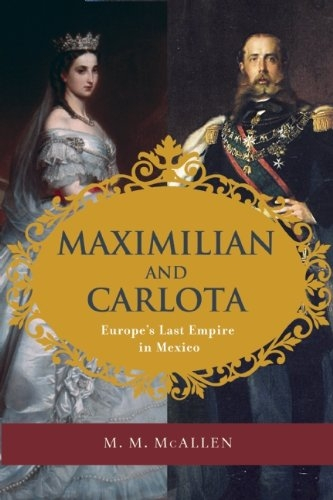
M. M. McAllen
Trinity University Press
Hardcover $29.95 (552pp)
978-1-59534-183-9
In 1861, knowing full well we Americans had our hands full fighting ourselves, the clever French made an all-out bid to annihilate the regime of Benito Juárez and claim Mexico, gaining a prized place in North America. With the 150th anniversary in mind (April 10, 1864), Maximilian and Carlota details Louis Napoléon’s intrepid scheme to install Maximilian von Habsburg and his wife as emperor and empress, but also details the intrigues and incongruities that occurred while nineteenth-century European leaders sought to remake the New World in their vision. Not long did this particular episode last: Max was executed by a Juárez firing squad in 1867.
MATT SUTHERLAND (November 30, 2013)
Practice on Mountains

David Bartone
Ahsahta Press / Boise State University
Softcover $18.00 (112pp)
978-1-934103-47-0
We close with a breathtaking collection of poetry: Practice on Mountains, by David Bartone, the most original, expressive thinker and writer we’ve encountered on this rollicking university tour. (An understatement, to be sure.) Bartone’s voice is thick with brutally honest introspection that doesn’t ever take itself too seriously. The lightness combined with incomparable wordcraft demands to be read by everyone who cares about poetry.
David, help us take our leave. From “Slippage is a Privilege Theme”:
“I answer questions with a pause, they know all my tricks by
now.
It is November 17.
The point in the semester where by now we have terrific
rapport.
…
The point they all point to the laughter moment in every teachable moment, and having perhaps dumbly encouraged it for two months, I am now beginning to show my discomfort with their mirth. I invent an obnoxious assignment for them to perform, the most beautiful person in the room is the one who seems to notice what I’m up to, I am always surprised to discover who it is this time.
…
This too is how love’s fallen into.
…
The person that is most looking at you.”
MATT SUTHERLAND (November 30, 2013)
Matt Sutherland
